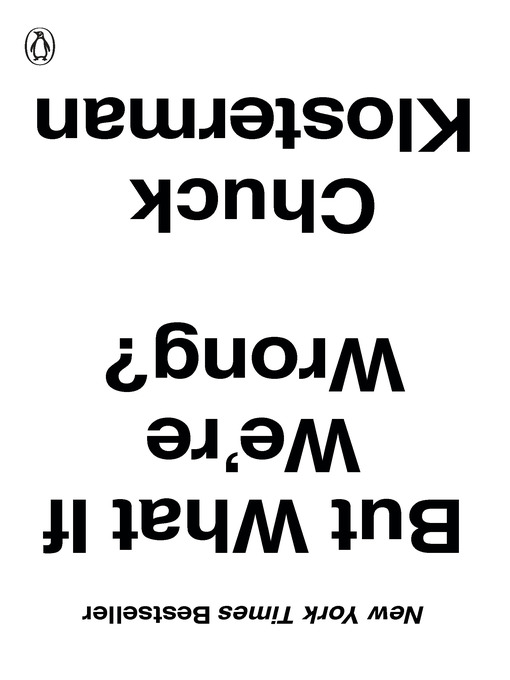
But What If We're Wrong?
Thinking About the Present As If It Were the Past
کتاب های مرتبط
- اطلاعات
- نقد و بررسی
- دیدگاه کاربران
نقد و بررسی

Starred review from April 18, 2016
Klosterman (I Wear the Black Hat) conducts a series of intriguing thought experiments in this delightful new book about how we conceive of the future. He begins with a conundrum virtually all writers contemplate at some point: why do some writers achieve literary immortality while others are totally forgotten? From there, he works through similar questions with respect to rock music and then shifts to wondering which of our established scientific principles might be replaced in the centuries to come. This is pop philosophy, but Klosterman takes it seriously enough to bring in heavyweight experts such as Neil deGrasse Tyson and George Saunders. Klosterman also considers the long-term viability of the NFL and team sports in general. He asks, supposing that the ancient Egyptians had TV, which of their TV shows would interest us most—the Egyptian Breaking Bad? He argues that we’d want the most realistic portrait of society possible, and that level of realism is only achieved unintentionally. As usual, Klosterman’s trademark humor and unique curiosity propel the reader through the book. He remains one of the most insightful critics of pop culture writing today and this is his most thought-provoking and memorable book yet.

April 1, 2016
An inquiry into why we'll probably be wrong about almost everything.The ever smart, witty, and curious Klosterman (I Wear the Black Hat: Grappling with Villains (Real and Imagined), 2013, etc.) takes on the notion that it's "impossible to understand the world of today until today has become tomorrow." One might call that a "klosterism," and the book is full of them. It's also full of intelligence and insights, as the author gleefully turns ideas upside down to better understand them. Klosterman is currently obsessed with ideas that are so accepted we dare not dispute them--e.g., gravity. Once upon a time, Aristotle believed things didn't float away because they were in their "natural place." Then Newton came along 2,000 years later and changed the way we think. Then Einstein said gravity was really a warping of time and space. Now, scientists are trying to "rethink gravity itself." Therefore, the author posits, in the future, whenever that may be, we'll know we were wrong about whatever we thought "gravity" was back then. In each chapter, Klosterman takes on a different topic, applying "Klosterman's Razor" to it: "the philosophical belief that the best hypothesis is the one that reflexively accepts its potential wrongness to begin with." He seeks out a variety of experts to assist him. George Saunders and Franz Kafka help him sort out why future literary greats are "at the moment...either totally unknown or widely disrespected." Physicists Neil deGrasse Tyson and Brian Greene help him explore the concept of a multiverse universe. Others assist Klosterman in taking on the future of rock 'n' roll ("there are still things about the Beatles that can't be explained"), time, dreams, democracy, TV shows (Roseanne is an overlooked work of "genius"), and sports. Klosterman is fond of lists and predictions. Here's one: this book will become a popular book club selection because it makes readers think. Replete with lots of nifty, whimsical footnotes, this clever, speculative book challenges our beliefs with jocularity and perspicacity.
COPYRIGHT(2016) Kirkus Reviews, ALL RIGHTS RESERVED.

Starred review from April 15, 2016
Best-selling author Klosterman (Sex, Drugs, and Cocoa Puffs; I Wear the Black Hat) provides a spin class for the brain in his latest work. Each of these connected essays examines an idea that seems unassailable, such as how gravity works, which musical artist or group most accurately defines rock and roll, the surprisingly ephemeral position of television within the history of artistic expression, and how we think of freedom and the U.S. constitution. Each proves to be a thigh-grinding uphill ride, pushing against the problem asserted by the title: that our foundational knowledge, in many cases, will inevitably change. Well researched and supported by interviews with scientist Neil deGrasse Tyson; authors Kathryn Schulz, Jonathan Lethem, and Malcolm Gladwell; singer-songwriter Ryan Adams; filmmaker Richard Linklater; and basketball star Kobe Bryant, among others, Klosterman challenges readers to reexamine the stability of basic concepts, and in doing so broadens our perspectives. VERDICT An engaging and entertaining workout for the mind led by one of today's funniest and most thought-provoking writers.--Paul Stenis, Pepperdine Univ. Lib., Malibu, CA
Copyright 2016 Library Journal, LLC Used with permission.

























دیدگاه کاربران